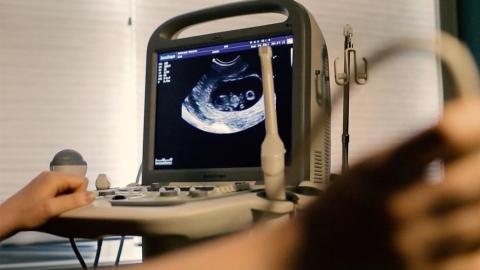A Russian Space Nuke? House Intel Chair Sounds Alarm, Urges Biden to Do Something
The White House publicly confirmed on Thursday that Russia has obtained a “troubling” emerging anti-satellite weapon, but says it cannot directly cause “physical destruction” on Earth.
White House National Security Council spokesperson John Kirby said U.S. intelligence officials have information that Russia has obtained the capability but that such a weapon is not currently operational. U.S. officials are analyzing the information they have on the emerging technology and have consulted with allies and partners on the matter.
The confirmation came after Rep. Mike Turner (R-OH), chairman of the House Intelligence Committee, urged the Biden administration to declassify information about what he called a "serious national security threat."
U.S. intelligence had gathered highly sensitive information about Russian anti-satellite weapons that was shared with government officials over the last several weeks.
Turner gave no details about the nature of the threat, and at the time, the Biden administration also declined to address it. But several leading lawmakers, including House Speaker Mike Johnson (R-LA), cautioned against being overly alarmed.
Johnson said he was not at liberty to disclose the classified information. "But we just want to assure everyone steady hands are at the wheel. We're working on it and there's no need for alarm," he told reporters at the Capitol.
Rep. Jim Himes (D-CT), the ranking member of the Intelligence Committee, agreed with Johnson, saying in a statement that the classified information is "significant" but "not a cause for panic."
Turner's announcement appeared to catch the Biden administration off-guard. National Security Adviser Jake Sullivan told reporters at the White House that he already had been due to brief Turner and other senior congressional leaders on Thursday. Sullivan did not disclose the topic or provide any other details related to Turner's statement.
***Please sign up for CBN Newsletters and download the CBN News app to ensure you keep receiving the latest news.***
 In Moscow, Kremlin spokesperson Dmitry Peskov described the claims about a new Russian military capability as a ruse intended to make the U.S. Congress support aid for Ukraine.
In Moscow, Kremlin spokesperson Dmitry Peskov described the claims about a new Russian military capability as a ruse intended to make the U.S. Congress support aid for Ukraine.
"It's obvious that Washington is trying to force Congress to vote on the aid bill by hook or by crook," Peskov said in remarks carried by Russian news agencies. "Let's see what ruse the White House will use."
Two Sources Verify Alleged Intel About Russian Space-Related Weapon
A congressional aide told the AP he understood that the threat relates to a space-deployed Russian anti-satellite weapon. Such a weapon could pose a major danger to U.S. satellites that transmit billions of bytes of data each hour.
The aide, speaking on condition of anonymity due to the sensitivity of the matter, said it was not yet clear if the Russian weapon has nuclear capability, but said that is the fear.
Another source told Fox News the threat is "concerning Russian capability" and said the "potential seriousness of the threat is grave," but "the threat is not immediate in nature."
A Pentagon source confirmed to the outlet the threat is related to space.
The highly sensitive classified information is related to a Russian military capability and its incomplete ambition to develop a nuclear weapon in space that could be used to target satellites, sources told The Wall Street Journal.
Meanwhile, Ukraine claimed Russia launched for the first time an advanced hypersonic missile that is difficult to shoot down, during an air raid on Kyiv earlier this month. The kind of missile allegedly used, if confirmed, would represent an escalation in Russia's capabilities of attacking Ukraine almost two years into the war, the outlet reported.
Space, known as the final frontier for exploration, could become an evolving threat to U.S. national security and was one of the primary reasons Congress passed, and then-President Donald Trump signed the act creating the United States Space Force in 2019.
China and Russia have already developed new capabilities that can interfere with critical satellite-based U.S. communications, such as GPS and the ability to quickly detect missile launches. In recent years, the U.S. has watched both countries seek ways to jam satellites, intercept their feeds, blind them, shoot them down, and even potentially grab them with a robotic arm to pull them out of their programmed orbits.
The Pentagon said in its 2020 Defense Space Strategy Summary that China and Russia presented the greatest strategic threat to U.S. space operations due to their aggressive development of counter space abilities, and their military doctrine. Both countries "view space as important to modern warfare and consider the use of counter space capabilities as a means for reducing U.S., allied, and partner military effectiveness and for winning future wars. China and Russia have weaponized space as a way to deter and counter a possible U.S. intervention during a regional military conflict."
During an interview with The Wall Street Journal in January, U.S. Chief of Space Operations Gen. Chance Saltzman said Russia's space capabilities haven't been diminished as a result of the war in Ukraine.
"They still have intentions to build weapons for space, and we are monitoring, assessing, and responding to them," Saltzman said without commenting on specific capabilities. He noted that Russia's destruction of a satellite in 2021 was a disruptive and significant event in space.
Meanwhile, the U.S. launched multiple satellites into low-Earth orbit Wednesday from the Cape Canaveral Space Force Station, Florida, that can detect global missile launches, according to the Pentagon.
The launch conducted by Space X totaled six satellites. Two belong to the U.S. Missile Defense Agency (MDA) and four others are with the Space Development Agency (SDA).



